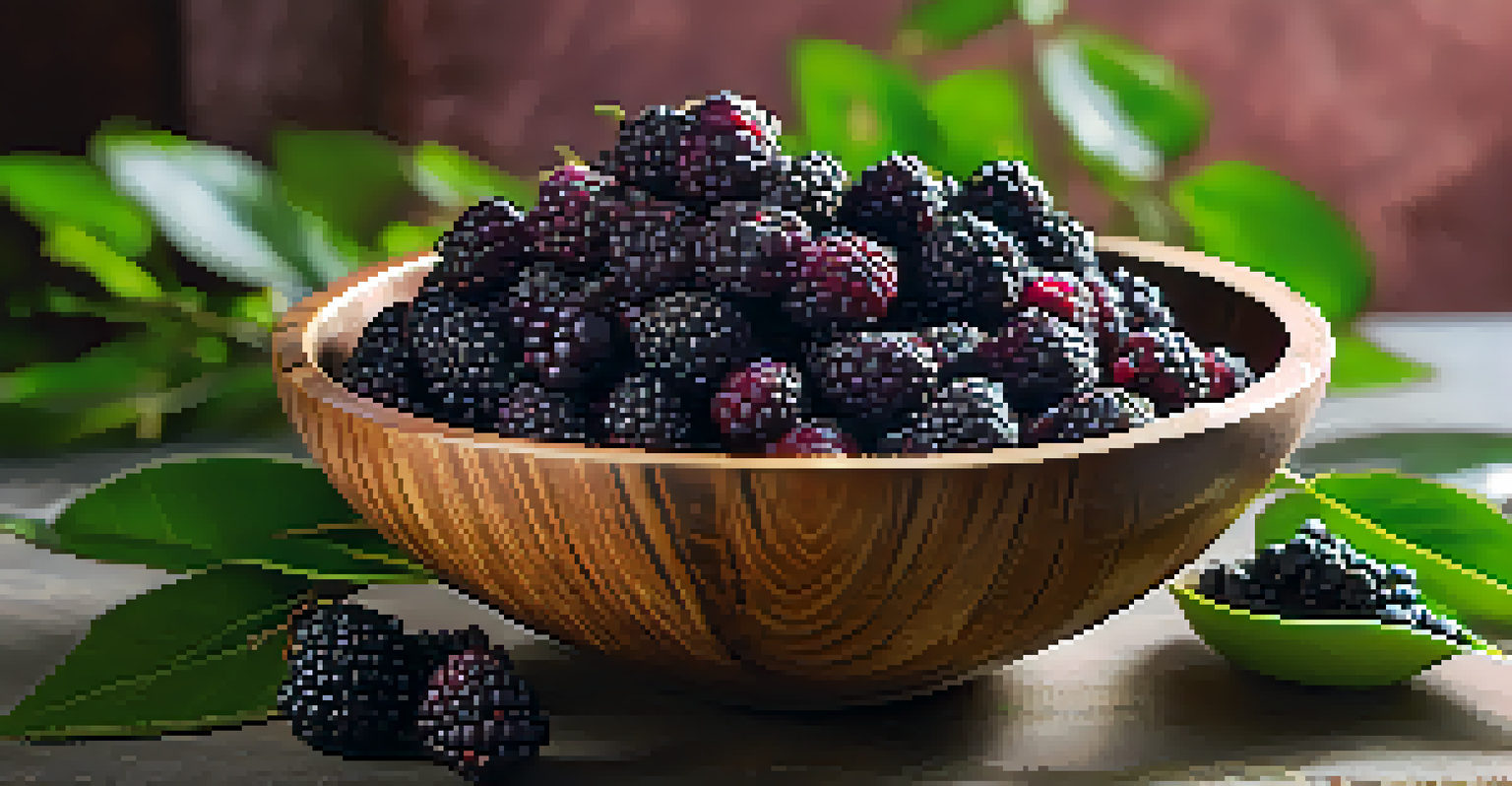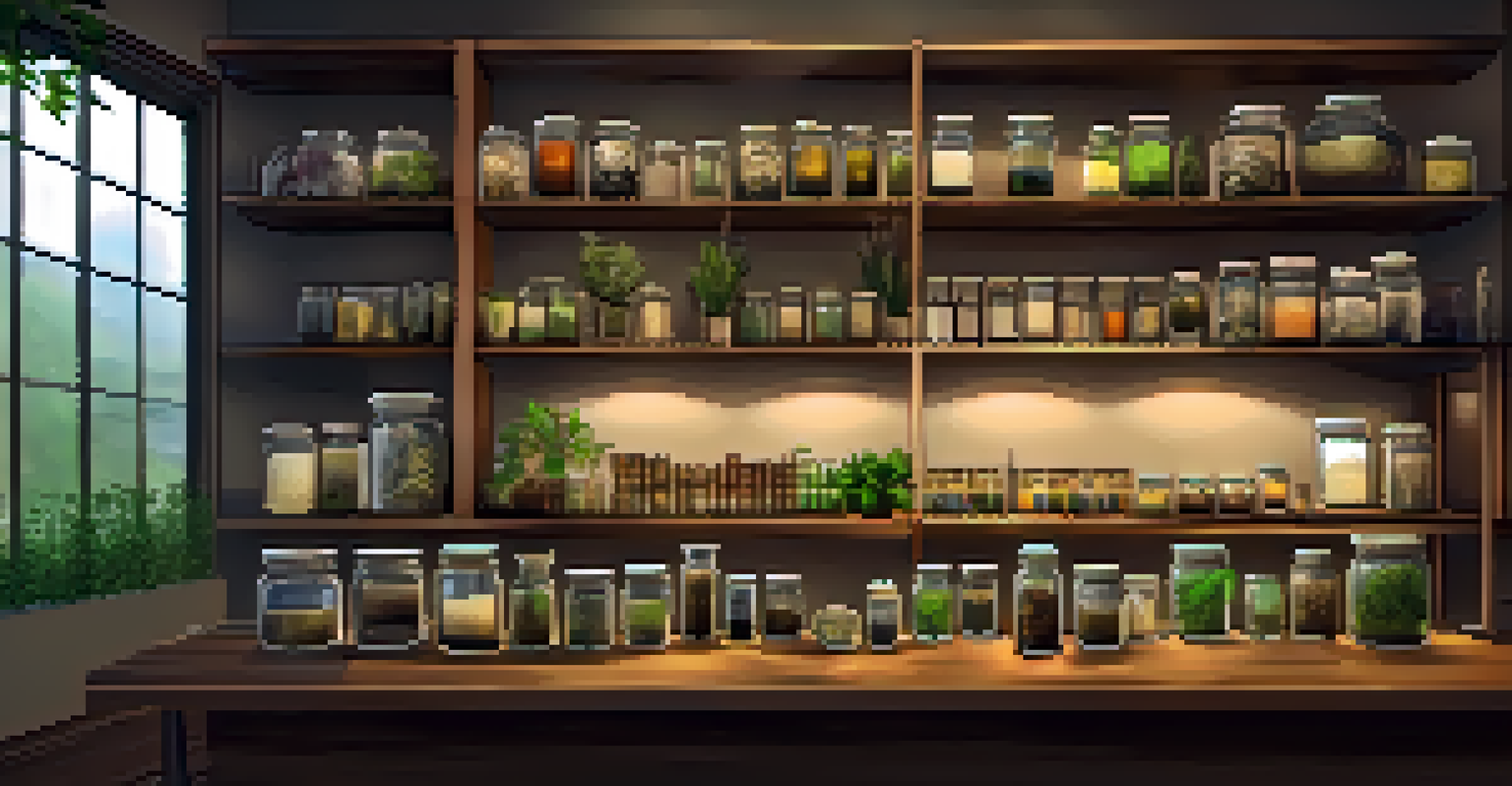Natural Healing: The Best Herbal Therapies in Brazil

The Rich Tradition of Herbal Medicine in Brazil
Brazil boasts a vibrant culture that celebrates the use of herbal medicine, rooted in indigenous practices and African traditions. Many Brazilian communities have relied on these natural remedies for generations, passing down knowledge of plants and their healing properties. This long-standing relationship with nature highlights the importance of biodiversity in promoting health and well-being.
Herbal medicine is a bridge between the world of nature and the world of healing.
One of the most fascinating aspects of Brazilian herbal medicine is its integration of spirituality and healing. Herbalists often combine plant remedies with rituals and cultural beliefs, creating a holistic approach to health. This unique blend fosters a deeper connection between individuals and their healing practices, emphasizing the importance of community support.
As awareness of natural healing grows, many people are turning to Brazilian herbal therapies not just for ailments but also for overall wellness. This shift reflects a broader trend toward natural, sustainable living, inviting more individuals to explore the benefits of herbal remedies and reconnect with the earth.
Popular Brazilian Herbs and Their Benefits
Among the most celebrated herbs in Brazil is Guaraná, known for its stimulating properties. Often consumed as a beverage, Guaraná can boost energy levels and enhance mental clarity, making it a popular choice for those needing an extra push during the day. Its caffeine content rivals that of coffee, but it also offers additional health benefits, such as improved digestion.

Another herbal gem is Açaí, often hailed for its antioxidant properties. This berry supports heart health and may aid in weight management, making it a favorite among health enthusiasts. Açaí bowls have become a trendy breakfast option worldwide, showcasing how Brazilian herbs can easily fit into modern diets.
Herbal Medicine's Cultural Roots
Brazil's herbal medicine is deeply embedded in indigenous and African traditions, emphasizing the importance of biodiversity for health.
Then there's the lesser-known but equally remarkable Mulungu, which is celebrated for its calming effects. Traditionally used to alleviate anxiety and promote relaxation, Mulungu can be a natural alternative to stress relief. Its gentle sedative properties make it a popular choice for those seeking a peaceful night's sleep.
The Role of Herbalists in Brazilian Communities
Herbalists, or 'curandeiros,' play a pivotal role in Brazilian communities, serving as healers and guides in the world of herbal medicine. Many of these practitioners have extensive knowledge passed down through generations, allowing them to understand the nuances of various plants and their effects on health. This deep-rooted expertise fosters a strong sense of trust within the community.
In every walk with nature, one receives far more than he seeks.
In addition to treating physical ailments, curandeiros often address emotional and spiritual issues, providing a comprehensive approach to healing. Their holistic methods resonate with many, as they emphasize the interconnectedness of body, mind, and spirit. This perspective can be particularly powerful in addressing the root causes of health issues rather than just the symptoms.
As the demand for natural remedies increases, the role of herbalists is becoming more recognized and respected. Many are now collaborating with modern healthcare practitioners to create integrative approaches that combine traditional wisdom with contemporary medicine, enhancing the overall effectiveness of healing practices.
Exploring the Amazon Rainforest for Healing Herbs
The Amazon rainforest, often referred to as the 'lungs of the planet,' is a treasure trove of medicinal plants. This vast and biodiverse ecosystem is home to countless herbs used in traditional healing practices. Exploring the Amazon offers not only a chance to discover new remedies but also highlights the importance of conservation efforts to protect these invaluable resources.
Many indigenous tribes have mastered the art of herbal medicine, utilizing plants for everything from pain relief to skin care. Their deep understanding of the rainforest's ecology is essential for sustainable harvesting and ensures that these plants continue to thrive for future generations. By learning from these communities, we can appreciate the balance between nature and health.
Popular Herbs and Their Benefits
Herbs like Guaraná, Açaí, and Mulungu showcase Brazil's rich herbal heritage, offering various health benefits from energy boosts to relaxation.
As modern science begins to validate traditional uses of these plants, researchers are discovering potential pharmaceutical applications. This intersection of traditional knowledge and scientific inquiry opens doors to new treatments and therapies, showcasing the importance of preserving the Amazon and its rich herbal heritage.
Sustainable Harvesting Practices for Herbal Remedies
As the demand for herbal remedies grows, sustainable harvesting practices are crucial to protect Brazil's rich biodiversity. Overharvesting can lead to the depletion of valuable plant species, threatening not only the environment but also the communities that rely on them for their health. Implementing responsible harvesting techniques ensures that these plants can continue to flourish.
Many herbalists advocate for sustainable practices, such as cultivating herbs in gardens rather than solely relying on wild harvesting. This approach not only preserves wild populations but also empowers communities by providing access to fresh, organic herbs. By growing their own, individuals can ensure quality and sustainability in their healing practices.
Education plays a vital role in promoting sustainable harvesting. Workshops and community initiatives help raise awareness about the importance of biodiversity and the need to respect natural resources. By fostering a culture of sustainability, we can protect Brazil's herbal legacy for generations to come.
The Future of Herbal Medicine in Brazil
The future of herbal medicine in Brazil looks promising, with a growing interest in natural health solutions on both local and global scales. As people seek alternatives to synthetic medications, the demand for herbal therapies continues to rise. This shift presents opportunities for herbalists and practitioners to expand their reach and share their knowledge with a wider audience.
Innovative approaches, such as integrating technology into herbal medicine, are emerging. From apps that provide information on herbal remedies to online workshops led by experienced herbalists, technology is bridging the gap between traditional healing practices and modern lifestyles. This fusion allows for greater accessibility and education regarding the benefits of herbal therapies.
Sustainable Practices for Healing
Sustainable harvesting and cultivation of herbs are crucial for preserving Brazil's biodiversity and ensuring the longevity of herbal medicine.
Moreover, as scientific research increasingly supports the efficacy of herbal remedies, more healthcare professionals are recognizing the value of incorporating these treatments into their practices. This collaboration between traditional and modern medicine can enhance patient care, offering a more holistic approach to health and wellness.
Embracing the Healing Power of Nature
At the heart of natural healing is the belief that nature holds the key to our well-being. Embracing herbal therapies not only supports our health but also fosters a deeper connection with the environment. This connection encourages us to appreciate the natural world and its gifts, reminding us of the importance of sustainability.
As we explore Brazil's rich herbal heritage, it's essential to approach these practices with respect and mindfulness. By learning about the plants, their uses, and the communities that nurture them, we can cultivate a more profound understanding of natural healing. This journey can lead to personal growth and a greater appreciation for the world around us.

Ultimately, embracing the healing power of nature empowers us to take control of our health. With the right knowledge and respect for the environment, we can harness the benefits of herbal therapies and contribute to a healthier planet for ourselves and future generations.